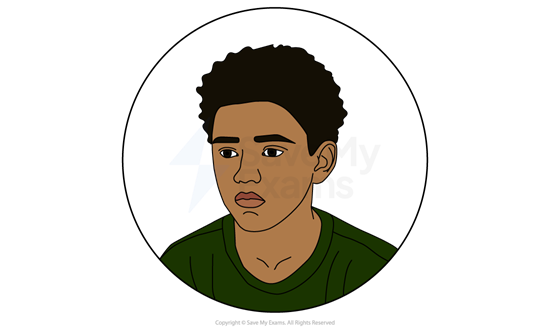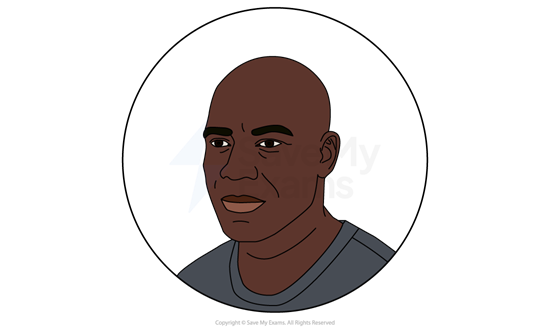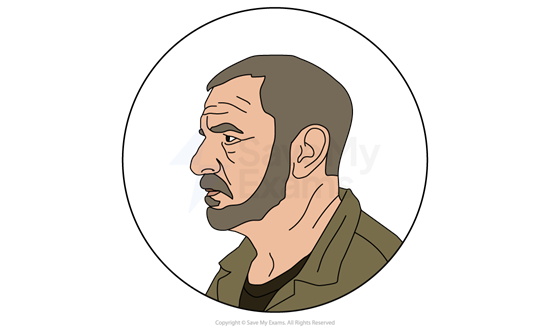My Name is Leon: Character Quotations (AQA GCSE English Literature): Revision Note
Exam code: 8702
My Name is Leon: Key Character Quotations
Examiners will be looking for evidence of your ability to interpret and analyse pivotal moments in the novel, as well as showing how and why characters act and change as the narrative progresses. Understanding key quotes from characters can also help you tie the context of the story together, showing how these are represented through the personalities and actions of different characters.
Here we will examine some important quotations from the following key characters:
Leon
Carol
Maureen
Tufty
Mr Devlin
Leon
“And, deep in his brain, he can hear something screaming and wailing, the new realisation that Maureen is just like everyone else”
 | Key word or phrase to memorise: “just like everyone else” | What the quotation means: Leon thinks Maureen is going to abandon him, just like everyone else has. | Theme: Loss |
| |||
“I could be him, Mum […] You could come back for me and, sometimes, I could be him”
 | Key word or phrase to memorise: “I could be him” | What the quotation means: Leon imitates being Jake in the hope his Mum would come back and care for him. | Theme: Childhood neglect |
| |||
“It could kill Earring if Leon picked it up and stabbed him through the soft bit of his eye. He would push the pen in and write on Earring’s brain: ‘I f***ing hate you. Black Power. From Leon’”
 | Key word or phrase to memorise: “write on Earring’s brain” | What the quotation means: Leon is starting to feel hurt and angry. He hates social services because they took away his brother. | Theme: Social injustice and discrimination |
| |||
“Leon likes the sound of Tufty’s voice and the feel of Tufty’s hands on his shoulder. He likes the way Tufty looks worried”
 | Key word or phrase to memorise: “Leon likes…Tufty” | What the quotation means: Running from Castro, Leon finds Tufty and likes how it feels to be protected by him. | Theme: Social injustice and discrimination |
| |||
Carol
“If you hadn’t been sneaking around he would have come in and spent two minutes with his only son”
 | Key word or phrase to memorise: “sneaking around” | What the quotation means: Carol blames Leon for Jake’s father not coming in, rather than seeing the reality. | Theme: Childhood neglect |
| |||
“Leon [...] I can’t manage myself, let alone you”
 | Key word or phrase to memorise: “manage myself” | What the quotation means: Leon recalls Carol saying this to him at their access visit, explaining that she isn’t well enough to care for him. | Theme: Childhood neglect |
| |||
“She gives a little curtsy like he’s a king and she’s a servant. She turns and is gone”
 | Key word or phrase to memorise: ”King” and “servant” | What the quotation means: This is Carol’s exit from the narrative, and possibly from Leon’s life entirely. | Theme: Belonging and identity |
| |||
Maureen
“I don’t think so [...] no good at stories, me. I don’t see the point of half of them”
 | Key word or phrase to memorise: “no good at stories” | What the quotation means: Leon asks Maureen for a story to help him sleep, but Maureen says no. | Theme: Belonging and identity |
| |||
“Jake’s got a chance, you mean. You’ve split them up and in my books that’s a sin and I won’t change my mind on that”
 | Key word or phrase to memorise: “Jake’s got a chance” | What the quotation means: Maureen is angry that Jake has been adopted and Leon hasn’t, and calls out the reason why: race. | Theme: Social injustice and discrimination |
| |||
“You’re frightening him, Carol. Pull yourself together”
 | Key word or phrase to memorise: “Pull yourself together” | What the quotation means: Maureen is listening to Carol and Leon’s conversation and feels compelled to intervene as Carol worries Leon. | Theme: Childhood neglect |
| |||
“And my job never ends because I look after you even when you’re not here because I think about you and I care for you and I love you”
 | Key word or phrase to memorise: “job never ends” | What the quotation means: Maureen is trying to calm an anxious Leon by reminding him she is an experienced and dedicated mother. | Theme: Belonging and identity |
| |||
Tufty
“These are babies [...] Fragile. Babies need looking after. Come”
 | Key word or phrase to memorise: “Babies need looking after” | What the quotation means: Tufty is showing Leon how the seeds he planted have started to grow. | Theme: Childhood neglect |
| |||
“We are not a warrior”
 | Key word or phrase to memorise: “not a warrior” | What the quotation means: This is a line from Tufty’s poem, ‘Ode to Castro’. | Theme: Social injustice and discrimination |
| |||
“You can manage in the sun what you can't manage in the rain”
 | Key word or phrase to memorise: “manage in the sun” | What the quotation means: Tufty explains that he needs to get his work at the allotment done while the weather is good. | Theme: Belonging and identity |
| |||
Mr Devlin
“They’re the same all over the world [...] Small minds, big feet”
 | Key word or phrase to memorise: “Small minds, big feet” | What the quotation means: Mr Devlin is pointing out that the police often act aggressively without first caring about the consequences of their actions. | Theme: Social injustice and discrimination |
| |||
“There are no kings or queens, Leon. There are people. This marriage is a marriage between two people, a man and a woman, nothing more”
 | Key word or phrase to memorise: “There are no kings and queens” | What the quotation means: Mr Devlin explains to Leon that some do not feel the same way about the upcoming Royal Wedding as Maureen and Sylvia. | Theme: Belonging and identity |
| |||
Sources
De Waal, K. (2016), My Name is Leon, Viking

Unlock more, it's free!
Was this revision note helpful?
